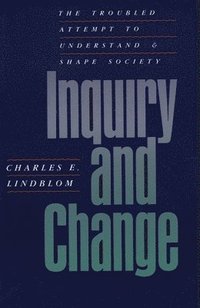
spara 45%
1 säljare
Inquiry and Change Upplaga 1
How do ordinary citizens, government officials, opinion leaders, or social scientists attempt to solve social problems? How competent are we at defining the problems, seeking information, and finding answers? In this important and controversial book, a distinguished social scientist meticulously analyzes our attempt to understand society so that we can reshape it. In so doing, he largely bypasses both epistemology and contemporary highly abstract theory on knowledge and society in order to acheive a far more concrete analysis of discourse and inquiry in social problem solving. There is a tragic discrepancy, argues Charles E. Lindblom, between our abilities to solve problems and the difficulty of the problems to be solved. We must make do with inadequate information and inconclusive analyses, for the task is less one of learning the truth than of proceeding in inquiry and decisions when the truth cannot be known. Lindblom discusses the many obstacles that prevent us from solving social problems, focusing in particular on learned incompetence. According to Lindblom, parents teach children not to think certain thoughts, and schools often engage more in indoctrination than education. Political rhetoric and commercial sales promotion feed a steady diet of misrepresentation. Social science does help. But because it is dependent on popular thought, it shares the impairments of thought found in both political figures and ordinary citizens. It also develops its own distinctive impairments and is to a degree crippled by its narrow view of scientific method--often more interested in proving than probing. Although social science can be improved in ways that Lindblom outlines in his book, social inquiry calls for such significant contributions from lay thought that it renders many conventional ideals of scientific problem solving inappropriate. Lindblom contends that the route to better social problem solving is not through either scientific or popular consensus or agreement, however much they are valued in the world of science and social science, but through a competition of ideas. The index of a society's competence, he states, is in its discord over ends, values, or purposes. "As usual, Lindblom cuts through to the core of the issue: How is society to understand its central problems and challenges? With originality and courage, he takes on the social scientists and the policy analysts, and presents an inspiring picture of a self-guiding democracy that continuously deliberates over means and ends. A signal contribution."--Robert B. Reich, Harvard University
Upplaga: 1a upplagan
Utgiven: 1992
ISBN: 9780300056679
Förlag: Yale University Press
Format: Häftad
Språk: Engelska
Sidor: 330 st
How do ordinary citizens, government officials, opinion leaders, or social scientists attempt to solve social problems? How competent are we at defining the problems, seeking information, and finding answers? In this important and controversial book, a distinguished social scientist meticulously analyzes our attempt to understand society so that we can reshape it. In so doing, he largely bypasses both epistemology and contemporary highly abstract theory on knowledge and society in order to acheive a far more concrete analysis of discourse and inquiry in social problem solving. There is a tragic discrepancy, argues Charles E. Lindblom, between our abilities to solve problems and the difficulty of the problems to be solved. We must make do with inadequate information and inconclusive analyses, for the task is less one of learning the truth than of proceeding in inquiry and decisions when the truth cannot be known. Lindblom discusses the many obstacles that prevent us from solving social problems, focusing in particular on learned incompetence. According to Lindblom, parents teach children not to think certain thoughts, and schools often engage more in indoctrination than education. Political rhetoric and commercial sales promotion feed a steady diet of misrepresentation. Social science does help. But because it is dependent on popular thought, it shares the impairments of thought found in both political figures and ordinary citizens. It also develops its own distinctive impairments and is to a degree crippled by its narrow view of scientific method--often more interested in proving than probing. Although social science can be improved in ways that Lindblom outlines in his book, social inquiry calls for such significant contributions from lay thought that it renders many conventional ideals of scientific problem solving inappropriate. Lindblom contends that the route to better social problem solving is not through either scientific or popular consensus or agreement, however much they are valued in the world of science and social science, but through a competition of ideas. The index of a society's competence, he states, is in its discord over ends, values, or purposes. "As usual, Lindblom cuts through to the core of the issue: How is society to understand its central problems and challenges? With originality and courage, he takes on the social scientists and the policy analysts, and presents an inspiring picture of a self-guiding democracy that continuously deliberates over means and ends. A signal contribution."--Robert B. Reich, Harvard University
Begagnad bok
239 kr433 krSpara 194 kr (45%) mot nypris
Fri frakt & skickas inom 1-3 vardagar
Köpskydd med Studentapan
Varje köp täcks av Studentapans köpskydd som säkerställer att boken kommer fram, att du får rätt bok och att skicket stämmer överens med beskrivning.



